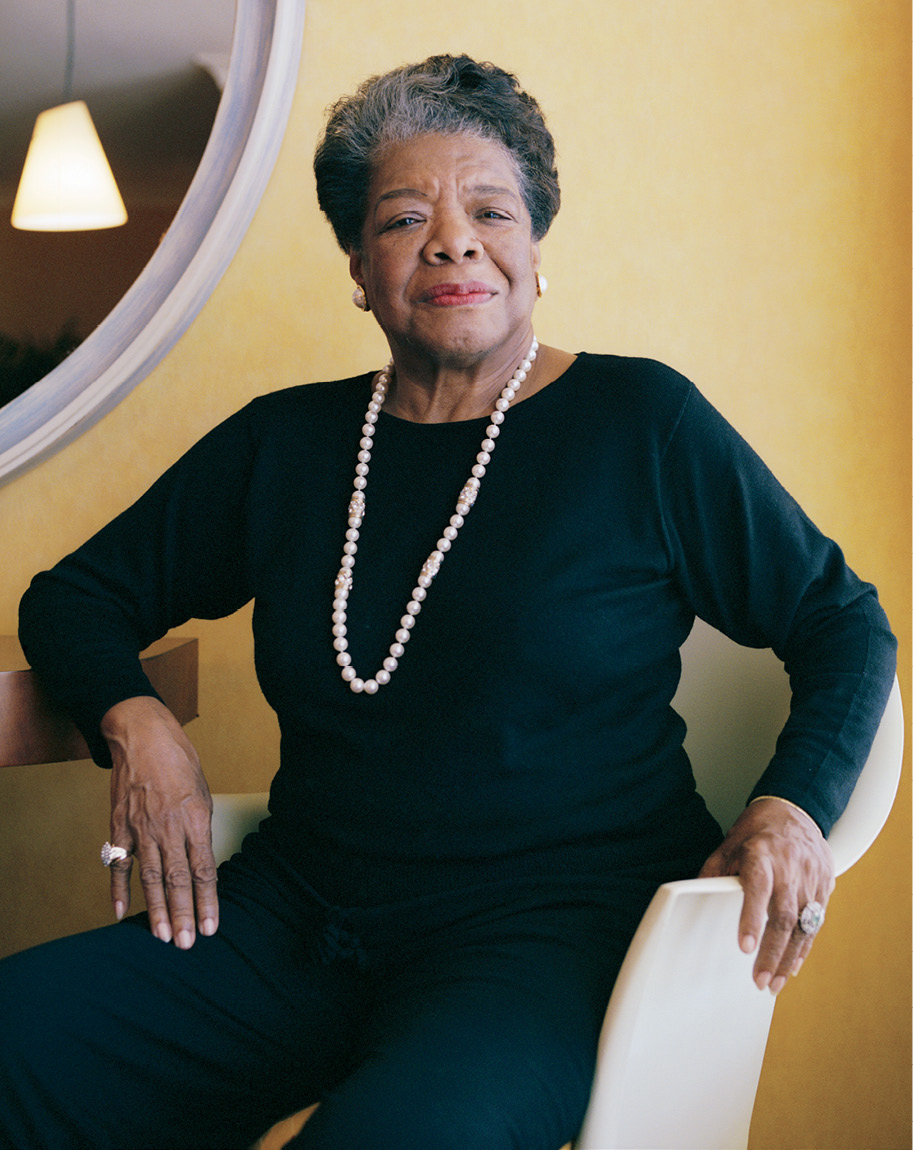Maya Angelou

Hillary
I read I Know Why the Caged Bird Sings right around the time it was published in 1969. It was a chaotic time for America. Dr. Maya Angelou’s book seemed like a fitting capstone to a decade of assassinations, riots, war, and social change.
Maya’s book recounts the cruel racism and backbreaking poverty she grew up surrounded by in Stamps, Arkansas, and the horrific rape she experienced in St. Louis at the age of eight, after which she stopped speaking for five years. Yet despite the tragedy and tumult of her own life, she came to embody unconquerable resilience. While I was reading that book, I had no idea at the time that I would one day live in Arkansas, be married to its governor, meet Maya, and become friends with her.
After Bill was elected president in 1992, I recommended that he invite her to speak at his inauguration. He enthusiastically agreed, and on January 20, 1993, Maya’s voice rang out over the large crowd stretching down the Mall. She recited the poem “On the Pulse of Morning,” which she had written for the occasion: “Lift up your hearts,” she said, “each new hour holds new chances for new beginnings.”
Maya was an expert on new beginnings and a champion of the human spirit. During the years she didn’t speak, she read every book in the black school library and as many as she could get from the white school’s. She memorized Shakespeare and Langston Hughes, Longfellow and James Weldon Johnson. Plays, poems, sonnets, passages—all of it fed her imagination. Out of the evil of the rape she suffered, she re-created herself: “I think that the courage to confront evil and turn it by dint of will into something applicable to the development of our evolution, individually and collectively, is exciting, honorable,” she explained.
Maya wrote books of essays, volumes of poetry, and six autobiographies. One of her signature pieces was “Phenomenal Woman: Four Poems Celebrating Women,” which she recited and performed all over the world. The words became an anthem of liberation and empowerment. “Pretty women wonder where my secret lies. I’m not cute, or built to suit a fashion model’s size,” she began.
When I ran for president in 2008, Maya hosted me at Wake Forest University, where she first lectured in 1973. There’s a section in a poem she wrote about my campaign that stuck with me: “There is a world of difference between being a woman, and being an old female. If you’re born a girl, grow up and live long enough, you can become an old female. But to become a woman is a serious matter. A woman takes responsibility for the time she takes up and the space she occupies.”
Dr. Maya Angelou was not only a wonderful poet—she was a wonderful friend to so many who knew her. Hard times were made easier, joyful times sweeter, because she was on your side. She was a walking, talking work of art. Being in a room with her was a bit like being in a room with the Mona Lisa. She was elegant, arresting, and six feet tall, but she seemed taller to me. And that voice! When she opened her mouth, that extraordinary voice would pour forth: rich, enthralling, making her seem even larger than life. She chose her words with care. She did not suffer fools, and never hesitated to tell you when she thought you were wrong. When she said that she believed in you, you actually believed her and began believing in yourself. Her sage advice has resonated throughout the years: “When someone shows you who they are, believe them the first time.”
Part of Maya’s magic was the fact that there wasn’t anyone else like her in the world, but somehow everyone could see something of themselves in her story, her aspirations, and the sheer scope of her life. You’re Italian? Maya spoke Italian. You’re a dancer? So was she. You’re from San Francisco? She conducted a streetcar there. She knew everyone, lived everywhere, read everything, and felt it all. The whole world was her home. All people were her people.
There’s a scene in Thornton Wilder’s play Our Town that almost could have been describing Maya. Emily Webb is saying goodbye to the world one last time, and she asks the stage manager: “Do any human beings ever realize life while they live it?—every, every minute?” And he says, “No. The saints and poets, maybe—they do some.” That was Maya. She realized her life while she lived it. And not only that, she savored it—every single second.
Throughout her life, she was often slotted into subcategories as writers wrote about her: A black writer. A civil rights activist. A women’s leader. Maybe that was the only way people could wrap their heads around who she was. In truth, she transcended all labels. There is, however, one that does stick. She could have been born anywhere in the world, but only in America could she have become who she did. Our country’s triumphs and progress over the past century are written all over her life. More than that—she helped write them. We’re a better country today because of her. She urged, demanded, and inspired millions of Americans to live kinder, braver, more honorable lives.
It’s hard to imagine a better example to follow.